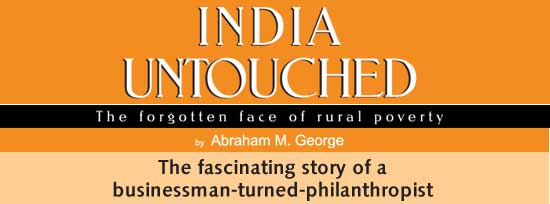
![]()
Rich man's passage to India's poorest
Monday, November 29, 2004
Abraham George knows too much of the world to be content in any one place in it -- and loves it too much to stop trying to change it.
So he is awake nearly all the time, on the phone to India and Europe in the middle of the night, talking and scheming, traveling the world every few weeks, worrying his own life and resources are finite while the problems he wants to solve are so overwhelming as to be practically infinite.
"You've got to start somewhere," says George, 57, a man oddly reminiscent of John or Robert Kennedy, patrician in bearing, well-groomed, restless, and passionate.
I speak for people who will never know me, who will never read my book."
His book -- "India Untouched" -- an indictment of corruption and neglect in India and the global economic forces that make a few, here and there, rich, and condemn far more to a poverty so grinding that it bears little resemblance to life as we know it.
The book is, he says, a bestseller in India, and is about to be released here by the Writers' Collective. The original foreword was by Ralph Nader but, after Nader's decision to run for president again, George asked columnist Thomas Friedman of the New York Times to write a new one. Friedman toured George's facilities and wrote about them.
The book is similar to Michael Harrington's "The Other America," the literary inspiration for the 1960s war on poverty. "India Untouched" details how politics and economics deprive most Indians of access to both basics -- water, food, schools, health care, shelter, clothing -- and less tangible benefits, like art, culture, language and hope.
Life in rural India, writes George, leaves the poor relegated to a social status "below the holy cow, the potent snake, and the spirited monkey."
The wealth that the revolution in technology and outsourcing of work from this country may have brought a few in India has only widened the gap.
"You might have a tiny wealthy class, and a growing middle class, but that amounts to, perhaps, 100 million people," says George. "A major market, true, but that leaves more than 1 billion Indians in poverty. Those are the people I write about."
But George's book, as important as it is in India, is only a small part of what the Boonton resident has done in the past decade to ameliorate wretched conditions in a country where he was raised in comfort, the son of a legal scholar and a physicist.
George came here after a wartime stint as an Indian army officer, joining his mother in Alabama, where she worked for NASA. He attended the University of Alabama in the '60s -- "They didn't know what to make of me -- a black with straight hair and a British accent?" He earned a doctorate at New York University.
Inspired by Gandhi and Nehru, George wed idealism and a business talent. He once asked a company that hired him to a low-level, part-time job as a student to expunge his employment record because he never wanted to be known as having worked for a profit-making firm.
Yet, in the '80s, he built a software company he sold a decade ago to make himself a multimillionaire, owning a staggering mansion in the Morris County woods. A mansion in the woods -- and a determination to use his wealth to change India.
So far, he has spent nearly all the money he made to build and operate a high-end boarding school for poor untouchables near Bangalore -- a school, a health center, an art gallery, a center for the economic empowerment of women, plantations to grow food for the poor and provide them with work and their own land, a university-level institute to train Indian journalists to fight corruption by reporting on it, a program designed to wipe out lead poisoning in Indian cities, efforts to stop female infanticide.
He says -- and his book describes the details -- trying to establish and operate these institutions brings him in direct conflict with local and national governments in India. Hands are endlessly out for bribes and local officials who don't get them from George incite the poor against him, warning the superstitious that medicines he provides will make men sterile, the books will try to make them, like George himself, a Christian.
"It is difficult for the poor to understand why anyone wants to help," he says.
It also is difficult for the rich, he says, to understand why they should help, but George is determined to try. With his own funds dwindling -- he lost a lot to the stock market dive and still spends more than $1 million a year there -- he is trying to raise money while making his plantations profitable.
"I'll do it through fund-raising and bananas," he says. With Israeli agricultural experts, he has been able to grow bananas in desert-like conditions around Bangalore.
All this demands amounts of time. He works as much now as he did when he ran his company -- and spends about half his time in India, supervising the projects he funds.
He wants to expand his schools and health centers, create, perhaps, a thousand throughout the country. In just decades, he says, he could help 100 million rural poor.
"That would be a great start," says Abraham George.
Bob Braun's columns appear Monday and Friday. He can be reached at rjbraun@webspan.net or (973) 392-4281.
